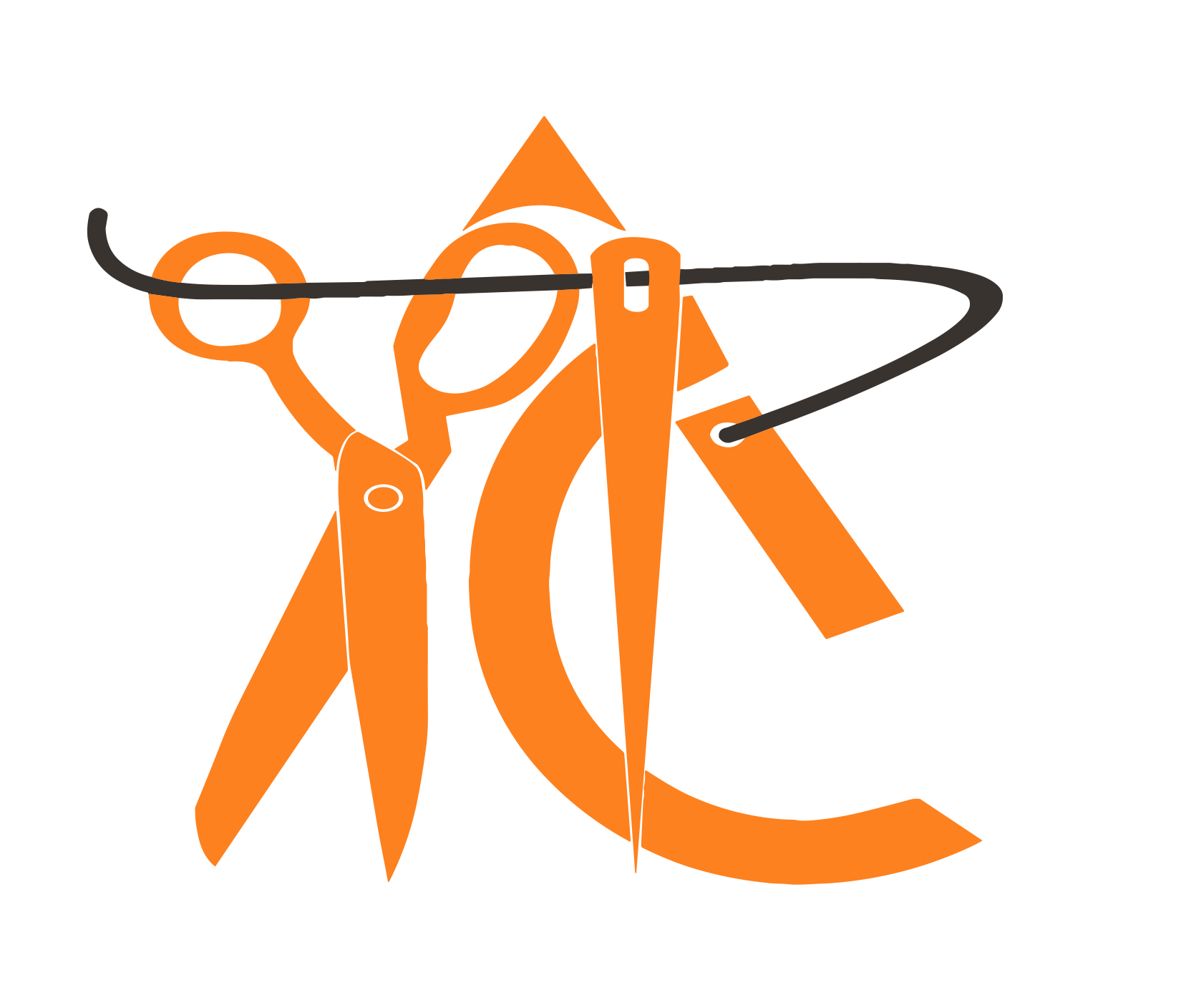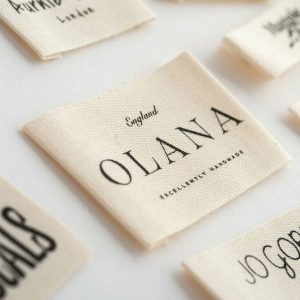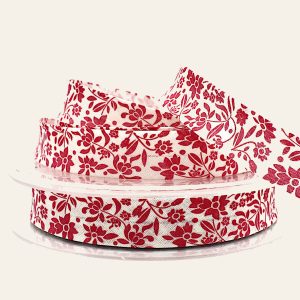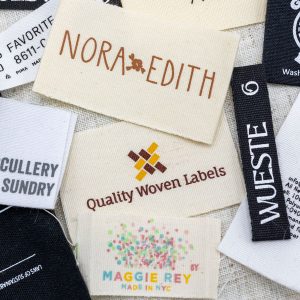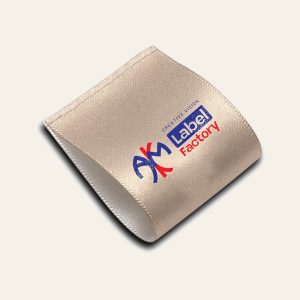Printed Label
Showing 1–12 of 30 results
Organic Cotton Printed Label
We specialize in producing organic cotton printed labels and tapes made from 100% organic cotton yarns. With a strong commitment to sustainability, we ensure that every label meets high-quality standards while remaining environmentally friendly.
Our organic cotton labels not only promote eco-consciousness but also offer a stylish appearance and a soft, comfortable feel. Available in a wide variety of woven cotton fabrics such as twill and herringbone, we provide premium products at efficient pricing to suit
Organic Cotton Printed Label 2
We specialize in producing organic cotton printed labels and tapes made from 100% organic cotton yarns. With a strong commitment to sustainability, we ensure that every label meets high-quality standards while remaining environmentally friendly.
Our organic cotton labels not only promote eco-consciousness but also offer a stylish appearance and a soft, comfortable feel. Available in a wide variety of woven cotton fabrics such as twill and herringbone, we provide premium products at efficient pricing to suit
Organic Cotton Printed Label 3
We specialize in producing organic cotton printed labels and tapes made from 100% organic cotton yarns. With a strong commitment to sustainability, we ensure that every label meets high-quality standards while remaining environmentally friendly.
Our organic cotton labels not only promote eco-consciousness but also offer a stylish appearance and a soft, comfortable feel. Available in a wide variety of woven cotton fabrics such as twill and herringbone, we provide premium products at efficient pricing to suit
Viscose Printed Tape & Label
Viscose is a type of rayon fiber derived from natural cellulose sources such as wood pulp or agricultural by-products. Through a regeneration process, the natural molecular structure of cellulose is preserved, allowing viscose to closely resemble natural fibers like silk, wool, cotton, and linen. Because of its silk-like texture, it is often referred to as artificial silk.
Unlike fully synthetic fibers made from polymers, viscose is semi-synthetic—it is manufactured but from natural raw materials. Variants of rayon include viscose, modal, and lyocell, each produced with different processes and characteristics.
Viscose may refer to:
- A viscous solution of cellulose
- A general synonym for rayon
- Specifically, viscose rayon, which is rayon made using the cellulose xanthate process
The production process involves dissolving wood or bamboo pulp in sodium hydroxide with carbon disulfide, creating a thick cellulose solution called viscose. This solution is then spun into fibers, resulting in a soft, versatile fabric.
Viscose rayon is widely used in:
- Fashion: dresses, shirts, linings, jackets, coats, and casual wear
- Home & Industry: upholstery, carpets, cleaning wipes, disposable cloths
- Technical applications: tyre cords, industrial yarns, and cellophane casting
Product Description
We offer a premium collection of Viscose Printed Labels & Tapes, designed with high-quality standards to meet diverse branding and packaging needs.
- Available in customized colors, shapes, sizes, and designs
- Manufactured with precision to match client specifications
- Soft, durable, and eco-friendly material suitable for garments and packaging
- Offered at competitive prices without compromising on quality
Our labels and tapes are produced under the strict supervision of skilled professionals, ensuring excellent finishing, durability, and clarity in print. Whether for fashion apparel, branding, or packaging solutions, our viscose labels deliver both aesthetic appeal and functional reliability.
Unlike fully synthetic fibers made from polymers, viscose is semi-synthetic—it is manufactured but from natural raw materials. Variants of rayon include viscose, modal, and lyocell, each produced with different processes and characteristics.
Viscose Printed Tape & Label 2
Viscose is a type of rayon fiber derived from natural cellulose sources such as wood pulp or agricultural by-products. Through a regeneration process, the natural molecular structure of cellulose is preserved, allowing viscose to closely resemble natural fibers like silk, wool, cotton, and linen. Because of its silk-like texture, it is often referred to as artificial silk.
Unlike fully synthetic fibers made from polymers, viscose is semi-synthetic—it is manufactured but from natural raw materials. Variants of rayon include viscose, modal, and lyocell, each produced with different processes and characteristics.
Viscose may refer to:
- A viscous solution of cellulose
- A general synonym for rayon
- Specifically, viscose rayon, which is rayon made using the cellulose xanthate process
The production process involves dissolving wood or bamboo pulp in sodium hydroxide with carbon disulfide, creating a thick cellulose solution called viscose. This solution is then spun into fibers, resulting in a soft, versatile fabric.
Viscose rayon is widely used in:
- Fashion: dresses, shirts, linings, jackets, coats, and casual wear
- Home & Industry: upholstery, carpets, cleaning wipes, disposable cloths
- Technical applications: tyre cords, industrial yarns, and cellophane casting
Product Description
We offer a premium collection of Viscose Printed Labels & Tapes, designed with high-quality standards to meet diverse branding and packaging needs.
- Available in customized colors, shapes, sizes, and designs
- Manufactured with precision to match client specifications
- Soft, durable, and eco-friendly material suitable for garments and packaging
- Offered at competitive prices without compromising on quality
Our labels and tapes are produced under the strict supervision of skilled professionals, ensuring excellent finishing, durability, and clarity in print. Whether for fashion apparel, branding, or packaging solutions, our viscose labels deliver both aesthetic appeal and functional reliability.
Unlike fully synthetic fibers made from polymers, viscose is semi-synthetic—it is manufactured but from natural raw materials. Variants of rayon include viscose, modal, and lyocell, each produced with different processes and characteristics.
Viscose Printed Tape & Label 3
Viscose is a type of rayon fiber derived from natural cellulose sources such as wood pulp or agricultural by-products. Through a regeneration process, the natural molecular structure of cellulose is preserved, allowing viscose to closely resemble natural fibers like silk, wool, cotton, and linen. Because of its silk-like texture, it is often referred to as artificial silk.
Unlike fully synthetic fibers made from polymers, viscose is semi-synthetic—it is manufactured but from natural raw materials. Variants of rayon include viscose, modal, and lyocell, each produced with different processes and characteristics.
Viscose may refer to:
- A viscous solution of cellulose
- A general synonym for rayon
- Specifically, viscose rayon, which is rayon made using the cellulose xanthate process
The production process involves dissolving wood or bamboo pulp in sodium hydroxide with carbon disulfide, creating a thick cellulose solution called viscose. This solution is then spun into fibers, resulting in a soft, versatile fabric.
Viscose rayon is widely used in:
- Fashion: dresses, shirts, linings, jackets, coats, and casual wear
- Home & Industry: upholstery, carpets, cleaning wipes, disposable cloths
- Technical applications: tyre cords, industrial yarns, and cellophane casting
Product Description
We offer a premium collection of Viscose Printed Labels & Tapes, designed with high-quality standards to meet diverse branding and packaging needs.
- Available in customized colors, shapes, sizes, and designs
- Manufactured with precision to match client specifications
- Soft, durable, and eco-friendly material suitable for garments and packaging
- Offered at competitive prices without compromising on quality
Our labels and tapes are produced under the strict supervision of skilled professionals, ensuring excellent finishing, durability, and clarity in print. Whether for fashion apparel, branding, or packaging solutions, our viscose labels deliver both aesthetic appeal and functional reliability.
Unlike fully synthetic fibers made from polymers, viscose is semi-synthetic—it is manufactured but from natural raw materials. Variants of rayon include viscose, modal, and lyocell, each produced with different processes and characteristics.
BCI Printed Tape & Label
The Better Cotton Initiative (BCI) is the world’s largest cotton sustainability program. Its mission is to make global cotton production better for farmers, better for the environment, and better for the future of the industry.
BCI works to transform cotton production worldwide by promoting Better Cotton as a mainstream sustainable commodity. Cotton produced under BCI standards follows responsible practices, ensuring that farmers:
- Minimize the harmful impact of crop protection methods
- Use water efficiently and safeguard its availability
- Maintain and improve soil health
- Protect natural habitats
- Preserve fiber quality
- Promote safe, fair, and decent working conditions
BCI’s Four Key Objectives:
- Reduce the environmental footprint of cotton production
- Enhance livelihoods and economic growth in cotton-growing regions
- Strengthen commitment to Better Cotton across the supply chain
- Ensure credibility and long-term sustainability of the initiative
Product Description
We offer a wide range of BCI standard printed labels and tapes manufactured to meet high-quality standards. Available in various printing colors, shapes, sizes, and designs, our products can be tailored to meet the specific requirements of clients.
Produced under strict quality supervision, our labels are designed to deliver durability, clarity, and sustainability. In addition, we provide these products at cost-effective rates, making them both practical and environmentally responsible.
BCI Printed Tape & Label 2
The Better Cotton Initiative (BCI) is the world’s largest cotton sustainability program. Its mission is to make global cotton production better for farmers, better for the environment, and better for the future of the industry.
BCI works to transform cotton production worldwide by promoting Better Cotton as a mainstream sustainable commodity. Cotton produced under BCI standards follows responsible practices, ensuring that farmers:
- Minimize the harmful impact of crop protection methods
- Use water efficiently and safeguard its availability
- Maintain and improve soil health
- Protect natural habitats
- Preserve fiber quality
- Promote safe, fair, and decent working conditions
BCI’s Four Key Objectives:
- Reduce the environmental footprint of cotton production
- Enhance livelihoods and economic growth in cotton-growing regions
- Strengthen commitment to Better Cotton across the supply chain
- Ensure credibility and long-term sustainability of the initiative
Product Description
We offer a wide range of BCI standard printed labels and tapes manufactured to meet high-quality standards. Available in various printing colors, shapes, sizes, and designs, our products can be tailored to meet the specific requirements of clients.
Produced under strict quality supervision, our labels are designed to deliver durability, clarity, and sustainability. In addition, we provide these products at cost-effective rates, making them both practical and environmentally responsible.
BCI Printed Tape & Label 3
The Better Cotton Initiative (BCI) is the world’s largest cotton sustainability program. Its mission is to make global cotton production better for farmers, better for the environment, and better for the future of the industry.
BCI works to transform cotton production worldwide by promoting Better Cotton as a mainstream sustainable commodity. Cotton produced under BCI standards follows responsible practices, ensuring that farmers:
- Minimize the harmful impact of crop protection methods
- Use water efficiently and safeguard its availability
- Maintain and improve soil health
- Protect natural habitats
- Preserve fiber quality
- Promote safe, fair, and decent working conditions
BCI’s Four Key Objectives:
- Reduce the environmental footprint of cotton production
- Enhance livelihoods and economic growth in cotton-growing regions
- Strengthen commitment to Better Cotton across the supply chain
- Ensure credibility and long-term sustainability of the initiative
Product Description
We offer a wide range of BCI standard printed labels and tapes manufactured to meet high-quality standards. Available in various printing colors, shapes, sizes, and designs, our products can be tailored to meet the specific requirements of clients.
Produced under strict quality supervision, our labels are designed to deliver durability, clarity, and sustainability. In addition, we provide these products at cost-effective rates, making them both practical and environmentally responsible.
Non-Optical Brightness Satin Printed Label
Optical brighteners are chemical compounds that absorb light in the ultraviolet and violet range (typically 340–370 nm) and re-emit it in the blue region (around 420–470 nm) through fluorescence. They are commonly used in fabrics and paper to create a “whitening effect” by reducing yellow or orange tones and enhancing brightness. However, not all applications require these additives.
Product Description
We specialize in offering a wide range of Non-Optical Brightness Satin Printed Labels that are designed to deliver a natural, elegant, and premium look without the use of optical brighteners. These labels are especially suited for products where a softer, more authentic finish is desired.
Our labels are available in a variety of:
- Printing colors
- Shapes and sizes
- Custom designs tailored to client specifications
Manufactured under strict quality standards, each label is carefully crafted to meet client requirements. We ensure durability, fine detailing, and consistent quality while keeping our solutions cost-effective.
Whether you need optical brightness or non-optical brightness labels, we provide versatile options to match your brand’s identity and packaging needs
Non-Optical Brightness Satin Printed Label 2
Optical brighteners are chemical compounds that absorb light in the ultraviolet and violet range (typically 340–370 nm) and re-emit it in the blue region (around 420–470 nm) through fluorescence. They are commonly used in fabrics and paper to create a “whitening effect” by reducing yellow or orange tones and enhancing brightness. However, not all applications require these additives.
Product Description
We specialize in offering a wide range of Non-Optical Brightness Satin Printed Labels that are designed to deliver a natural, elegant, and premium look without the use of optical brighteners. These labels are especially suited for products where a softer, more authentic finish is desired.
Our labels are available in a variety of:
- Printing colors
- Shapes and sizes
- Custom designs tailored to client specifications
Manufactured under strict quality standards, each label is carefully crafted to meet client requirements. We ensure durability, fine detailing, and consistent quality while keeping our solutions cost-effective.
Whether you need optical brightness or non-optical brightness labels, we provide versatile options to match your brand’s identity and packaging needs
Non-Optical Brightness Satin Printed Label 3
Optical brighteners are chemical compounds that absorb light in the ultraviolet and violet range (typically 340–370 nm) and re-emit it in the blue region (around 420–470 nm) through fluorescence. They are commonly used in fabrics and paper to create a “whitening effect” by reducing yellow or orange tones and enhancing brightness. However, not all applications require these additives.
Product Description
We specialize in offering a wide range of Non-Optical Brightness Satin Printed Labels that are designed to deliver a natural, elegant, and premium look without the use of optical brighteners. These labels are especially suited for products where a softer, more authentic finish is desired.
Our labels are available in a variety of:
- Printing colors
- Shapes and sizes
- Custom designs tailored to client specifications
Manufactured under strict quality standards, each label is carefully crafted to meet client requirements. We ensure durability, fine detailing, and consistent quality while keeping our solutions cost-effective.
Whether you need optical brightness or non-optical brightness labels, we provide versatile options to match your brand’s identity and packaging needs
